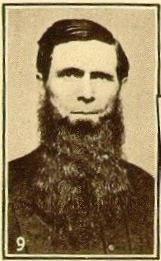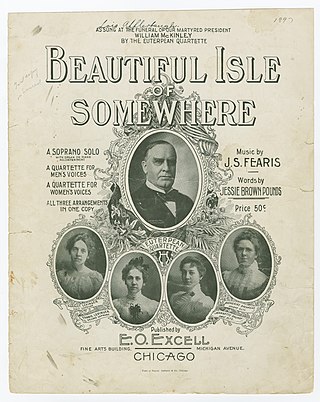Related Research Articles

A barbershop quartet is a group of four singers who sing music in the barbershop style, characterized by four-part harmony without instrumental accompaniment, or a cappella. The four voices are: the lead, the vocal part which typically carries the melody; a bass, the part which provides the bass line to the melody; a tenor, the part which harmonizes above the lead; and a baritone, the part that frequently completes the chord. The baritone normally sings just below the lead singer, sometimes just above as the harmony requires. Barbershop music is typified by close harmony— the upper three voices generally remain within one octave of each other.

Barbershop vocal harmony, as codified during the barbershop revival era (1930s–present), is a style of a cappella close harmony, or unaccompanied vocal music, characterized by consonant four-part chords for every melody note in a primarily homorhythmic texture. Each of the four parts has its own role: generally, the lead sings the melody, the tenor harmonizes above the melody, the bass sings the lowest harmonizing notes, and the baritone completes the chord, usually below the lead. The melody is not usually sung by the tenor or baritone, except for an infrequent note or two to avoid awkward voice leading, in tags or codas, or when some appropriate embellishment can be created. One characteristic feature of barbershop harmony is the use of what is known as "snakes" and "swipes". This is when a chord is altered by a change in one or more non-melodic voices. Occasional passages may be sung by fewer than four voice parts.

"It's a Long Way to Tipperary" is an English music hall song first performed in 1912 by Jack Judge, and written by Judge and Harry Williams, though authorship of the song has long been disputed.

The Fightin' Texas Aggie Band is the official marching band of Texas A&M University. Composed of over 400 men and women from the school's Corps of Cadets, it is the largest military marching band in the United States. The band's complex straight-line marching maneuvers are performed exclusively to traditional marches.
The Aggie War Hymn is the war hymn of Texas A&M University; officially, the school does not have a fight song.
"Homer's Barbershop Quartet" is the first episode of the fifth season of the American animated television series The Simpsons. It originally aired on the Fox network in the United States on September 30, 1993. It features the Be Sharps, a barbershop quartet founded by Homer Simpson. The band's story roughly parallels that of the Beatles. George Harrison and David Crosby guest star as themselves, and the Dapper Dans partly provide the singing voices of the Be Sharps.

The Dapper Dans are a barbershop quartet that performs at Disneyland in Anaheim, California, at the Magic Kingdom at the Walt Disney World Resort, and at Hong Kong Disneyland in Lantau Island, Hong Kong. A quartet also performed at Disneyland Paris from the opening in 1992 until 1995 and were known as The Main Street Quartet. The Paris quartet, known as “Nickelodeon” before joining the park, comprised Martin Baker, Mark Grindall, Steve Green and Jim Mullen. The quartet continued together after leaving Disney and still sing together from time to time. The Bass, Mark Grindall, still works extensively in Barbershop as a successful vocal coach and choral director.

"Bringing in the Sheaves" is a popular American Gospel song used almost exclusively by Protestant Christians. The lyrics were written in 1874 by Knowles Shaw, who was inspired by Psalm 126:6, "He that goeth forth and weepeth, bearing precious seed, shall doubtless come again with rejoicing, bringing his sheaves with him." Shaw also wrote music for these words, but they are now usually set to a tune by George Minor, written in 1880.

"Pretty Baby" is a song written by Tony Jackson during the Ragtime era. The song was remembered as being prominent in Jackson's repertory before he left New Orleans in 1912, but was not published until 1916.

"(You're the Flower of My Heart,) Sweet Adeline" is a ballad best known as a barbershop standard. It was first published in 1903, with lyrics by Richard Husch Gerard to music by Harry Armstrong, from a tune he had written in 1896 at the age of 18. According to a 1928 newspaper story, the lyrics were inspired "by a girl who worked at the music counter of a New York department store." After failing to find a publisher with the initial title, "You're the Flower of My Heart, Sweet Rosalie", according to a story the two decided a new title was in order and were inspired by a poster advertising the farewell tour of opera singer Adelina Patti. It did not become a hit until it was performed in 1904 by the group The Haydn Quartet. The Haydn Quartet's version was #1 for 10 weeks in 1904, and the Peerless Quartet also hit #1 with their version in 1904, for three weeks, according to Joel Whitburn's Pop Memories.

The traditions of Texas A&M University are a key aspect of the culture of Texas A&M University. Some of the school traditions date to the 1890s, shortly after the opening of the school, while others have been introduced more recently. These traditions encourage current students and alumni (Aggies) to cultivate the Aggie Spirit, a sense of loyalty and respect for the school, and dictate many aspects of student life, including how to greet others, how to act at an A&M sporting event, and what words a student may use in conversation. The most visible tradition among senior class students and alumni is the wearing of the Aggie Ring, whose design has been relatively unchanged since its introduction in 1894. Not all Aggie traditions are recognized by the university, and some, like Bonfire, have been discontinued for safety reasons. Texas Monthly states that the students' respect for school traditions and values is the university's greatest strength.

The fifth season of the American animated television series The Simpsons originally aired on the Fox network between September 30, 1993, and May 19, 1994. The showrunner for the fifth production season was David Mirkin who executive produced 20 episodes, with the season being produced by Gracie Films and 20th Century Fox Television. Al Jean and Mike Reiss executive produced the remaining two, which were both hold overs that were produced for the previous season. The season contains some of the series' most acclaimed and popular episodes, including "Cape Feare", "Lisa vs. Malibu Stacy", "Homer Goes to College", "Deep Space Homer", and "Rosebud". It also includes the 100th episode, "Sweet Seymour Skinner's Baadasssss Song". The season was nominated for two Primetime Emmy Awards and won an Annie Award for Best Animated Television Program as well as an Environmental Media Award and a Genesis Award. The DVD box set was released in Region 1 on December 21, 2004, Region 2 on March 21, 2005, and Region 4 on March 23, 2005.

"My Melancholy Baby" is a popular song published in 1912 and first sung publicly by William Frawley. The music was written by Ernie Burnett (1884–1959), the lyrics by George A. Norton.
Many terms are unique to, or hold a special meaning connected with, Texas A&M University in College Station, Texas. The university, often called A&M or TAMU, is a public research university and is the flagship institution of the Texas A&M University System. It opened in 1876 as the Agricultural and Mechanical College of Texas, the first public institution of higher education in that state. In 1963, the Texas Legislature renamed the school to Texas A&M University to reflect the institution's expanded roles and academic offerings. The letters "A&M" no longer have any explicit meaning but are retained as a link to the university's past.

The Texas A&M Singing Cadets are a male choral group at Texas A&M University. Nicknamed "The Voice of Aggieland", the Singing Cadets have been touring for 109 seasons, with their roots in a glee club founded on the A&M campus in 1893. The Singing Cadets are one of the oldest collegiate singing organizations in the world. They have toured both in America and abroad and have earned recognition by doing so, including invitations to sing for American presidents. Contrary to their name, the Singing Cadets are not all members of the Corps of Cadets and have not been since 1963, when the university as a whole ceased mandating Corps membership. Between 1996 and 2006, the Singing Cadets traveled over 35,000 miles and performed more than 450 concerts worldwide.

Vocal harmony is a style of vocal music in which a consonant note or notes are simultaneously sung as a main melody in a predominantly homophonic texture. Vocal harmonies are used in many subgenres of European art music, including Classical choral music and opera and in the popular styles from many Western cultures ranging from folk songs and musical theater pieces to rock ballads. In the simplest style of vocal harmony, the main vocal melody is supported by a single backup vocal line, either at a pitch which is above or below the main vocal line, often in thirds or sixths which fit in with the chord progression used in the song. In more complex vocal harmony arrangements, different backup singers may sing two or even three other notes at the same time as each of the main melody notes, mostly with a consonant, pleasing-sounding thirds, sixths, and fifths.

Coney Island has been featured in novels, films, television shows, cartoons, and theatrical plays.

The Texas–Texas A&M football rivalry is an American college football rivalry between the Texas Longhorns and the Texas A&M Aggies. The rivalry was played every year between 1915 and 2011, until A&M left the Big 12 Conference to join the Southeastern Conference during the 2010–12 Southeastern Conference realignment as a part of the wider 2010–2014 NCAA conference realignment. Texas currently leads the series 76–37–5. Texas and Texas A&M will resume this game starting on November 30, 2024as a part of the Southeastern Conference's rivalry week at the end of the regular season.

"Beautiful Isle of Somewhere" is a song with words by Jessie Brown Pounds and music by John Sylvester Fearis, written in 1897. The song gained huge popularity when it was used in William McKinley's funeral. It was subsequently a staple at funerals for decades, and there are dozens of recorded versions.
James Vernon "Pinky" Wilson was an American soldier who is known for being the author of the "Aggie War Hymn", which is the de facto fight song of Texas A&M University.
References
- ↑ Nash, Indiana (May 17, 2018). "SCCC barbershop quartet wins international competition". The Daily Gazette . Retrieved December 26, 2020.
- ↑ Groce, Nancy (1999). New York: Songs of the City. Watson-Guptill p. 98. ISBN 978-0-8230-8349-7.
- ↑ Fiedler, Rebecca (November 11, 2018). "Family of the 'Aggie War Hymn' author James 'Pinky' Wilson recognized during halftime at Texas A&M-Ole Miss game". The Bryan-College Station Eagle . Retrieved December 26, 2020.